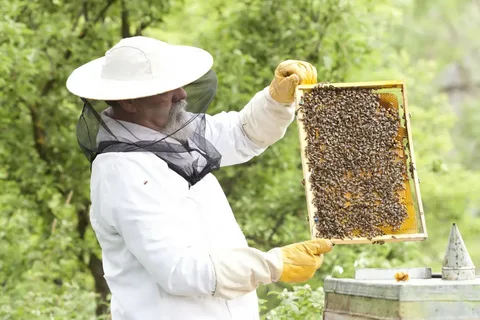Bees play a critical role in maintaining ecological balance and supporting agriculture. These industrious insects are essential pollinators, significantly contributing to the process of food production. By transferring pollen from one flower to another, bees facilitate the reproduction of many plants, including a substantial portion of the crops that make up our diet. Their pollination efforts enhance the yield and quality of fruits, vegetables, nuts, and seeds, which are vital for human nutrition and the global food supply. Understanding the importance of bees in pollination and food production highlights the urgent need to protect and preserve these valuable creatures to ensure the sustainability of our ecosystems and agricultural systems.
The Process of Pollination
How Bees Pollinate
Pollination is the process by which pollen is transferred from the male parts of a flower (anthers) to the female parts (stigma) of the same or another flower. Bees, attracted by the bright colors and sweet scents of flowers, land on the blooms to collect nectar and pollen. As they move from flower to flower, bees inadvertently transfer pollen, thus fertilizing plants. This fertilization is crucial for the production of fruits, seeds, and vegetables.
Types of Pollination
There are two main types of pollination: self-pollination and cross-pollination. Self-pollination occurs when pollen from the same plant fertilizes its flowers. Cross-pollination, which is more common and beneficial, involves pollen being transferred between different plants. Bees are particularly effective at cross-pollination, enhancing genetic diversity and resilience in plants, which are vital for sustainable food production.
Bees and Food Production
Contribution to Crop Yield
Bees contribute to the yield of approximately 75% of the world’s food crops. Crops like apples, almonds, blueberries, and cucumbers rely heavily on bee pollination. Without bees, the quantity and quality of these crops would diminish, leading to reduced food production. The economic value of bees’ pollination services is estimated to be in the billions of dollars annually, underscoring their indispensable role in agriculture.
Enhancing Food Security
By improving crop yields and quality, bees play a significant role in enhancing food security. As the global population continues to grow, the demand for food production increases. Bees help meet this demand by ensuring that crops are adequately pollinated, leading to more abundant harvests. This, in turn, supports the food supply chain, stabilizes prices, and helps combat hunger and malnutrition.
Threats to Bee Populations
Environmental Stressors
Despite their importance, bee populations are facing numerous threats. Pesticides, habitat loss, climate change, and diseases are major factors contributing to the decline of bee populations. Pesticides, particularly neonicotinoids, can be toxic to bees, impairing their ability to forage and reproduce. Habitat loss due to urbanization and agriculture reduces the availability of forage plants and nesting sites for bees.
The Impact of Climate Change
Climate change is altering the distribution of flowering plants, which in turn affects the availability of food for bees. Changes in temperature and weather patterns can disrupt the synchrony between bees and the plants they pollinate. This mismatch can lead to reduced pollination efficiency and lower crop yields, thereby impacting food production.
The Role of Bee Removal Services
Ensuring Safe Relocation
As urban areas expand, human-bee interactions have increased, sometimes leading to the need for bee removal. It is essential to handle these situations with care to ensure the safety of both humans and bees. Services like a bee removal service Los Angeles provide safe and humane relocation of bee colonies, preventing harm to these crucial pollinators. By opting for professional removal services, we can protect bees and their vital role in food production.
Promoting Conservation
Bee removal services also promote conservation efforts by educating the public about the importance of bees. They advocate for the creation of bee-friendly environments, such as planting native flowers and reducing pesticide use. These initiatives help create a sustainable habitat for bees, supporting their populations and, consequently, food production.
Promoting Bee-Friendly Practices
Sustainable Agriculture
Farmers and gardeners can adopt bee-friendly practices to support bee populations. Planting diverse crops and flowering plants provides bees with a continuous food source. Reducing pesticide use and choosing organic alternatives can mitigate the negative impacts on bees. By creating a healthy environment for bees, we can ensure their continued contribution to food production.
Community Involvement
Communities can play a vital role in bee conservation by participating in initiatives such as creating pollinator gardens, supporting local beekeepers, and advocating for policies that protect bee habitats. Education and awareness campaigns can inform the public about the significance of bees and encourage collective action to safeguard these essential pollinators.
Summary
Bees are indispensable to pollination and food production. Their role in enhancing crop yields, supporting food security, and maintaining ecological balance cannot be overstated. However, the threats facing bee populations are significant and require immediate attention. By understanding the vital role bees play and taking proactive measures to protect them, we can ensure a sustainable and secure food supply for future generations. Embracing bee-friendly practices and supporting professional bee removal services like bee removal service Los Angeles can contribute to the preservation of these essential pollinators, ensuring they continue to thrive and support our agricultural systems.
